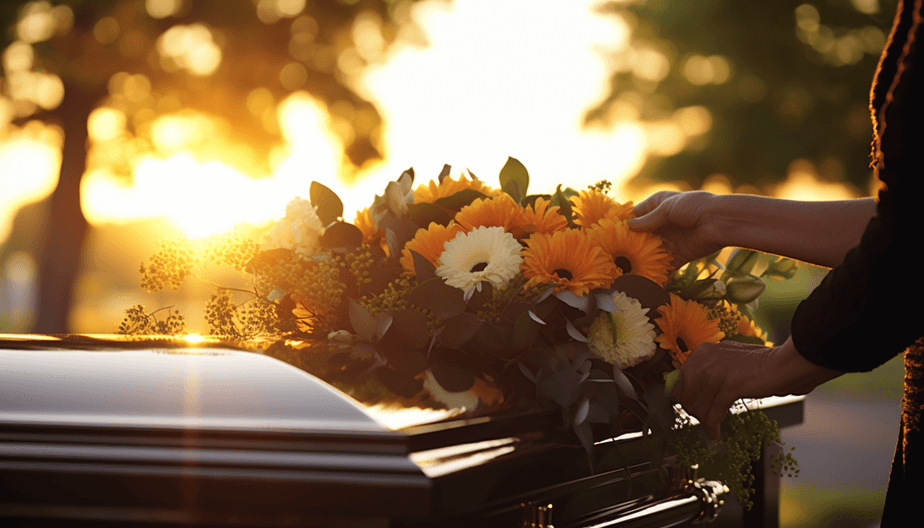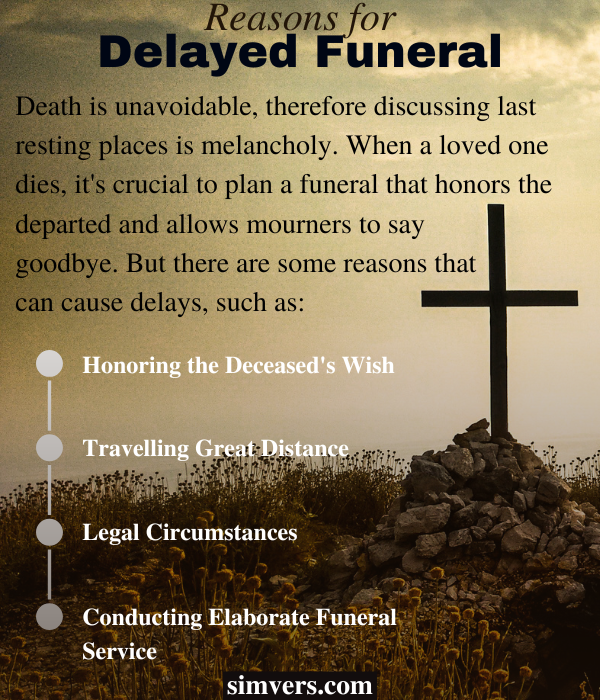
Death has such a finality to it. It leaves us empty and longing for the person we lost. You wonder how to move on and how to go back to everyday life again.
Last resting sites are mournful because death is inevitable. It’s important to prepare a funeral that honors the deceased and lets mourners say farewell.
So many questions need answers, such as what should the funeral be like? How long do you wait before holding a funeral? What is the recommended time between death and burial?
These questions are harrowing and often leave us feeling helpless. The stress of organizing a loved one’s funeral is enough to make anyone lose their cool. But with careful consideration, you can ensure that your loved one’s funeral is everything they deserve.
This article will help you navigate the rough terrain so that your loved one’s funeral is a celebration of their life and not just another thing to stress about. Let’s go!
What’s the Average Time You Should Wait Before a Loved One’s Funeral?

The time between death and burial is two days in the United States. This is a general guideline, though, and can vary depending on the circumstances of your loved one’s death.
If they died suddenly or unexpectedly, you might not have much time to plan their funeral. But if they were sick for some time before passing away, you may have more flexibility in deciding when to hold their service.
However, for a standard funeral, about two weeks is the average time between a loved one’s death and burial. Family members can decide to hold a funeral immediately after someone passes away, or the deceased person may request it in their will or estate planning documents.
When Can You Hold a Funeral?
Late morning or midday is the ideal time to hold a funeral, as it allows people to attend without missing work or school. The time of day will vary based on location. For example, funerals are often held early in the morning in rural areas because people have to travel long distances to get there.
If you’re organizing a loved one’s funeral and they lived in an area with heavy traffic congestion, then afternoon hours might be best for attendees.
Funeral homes are usually less busy on Sundays, so you may have more flexibility in choosing the time of day. This is vital if you have a large family or someone else is planning the funeral service.
If you’re having a public visitation or viewing before the funeral service begins, then late afternoon hours are likely best for families who need to drive long distances to get there.
MORE:
- Roman Catholic vs. Lutheran
- Roman Gods & Goddesses
- Bible about Suicide
- Best Order To Read The Bible
- Why Does God Hate Me?
How Long Should You Wait After Death for Cremation?
The time you can wait before cremation depends on several factors, including the weather and your local laws. However, the sooner you begin the process after a loved one dies, the better. Cremation takes about two hours to complete and can be done as soon as 24 hours after death.
However, some states have strict rules about how soon after death a person may be cremated. If this applies to you or your loved one who died in a hospital or nursing home where they were under constant care by medical professionals, you may need to wait longer.
Are There Reasons for Delaying a Funeral?
Sometimes, there may be solid reasons to delay a funeral.
A Desire to Honor the Deceased’s Specific Wishes
If your loved one made specific requests about how they wanted to be buried or cremated, it’s important to honor their wishes. If you are planning a funeral, it’s essential that you talk with the person who carries out those wishes.
Relatives Are Traveling Great Distances
A funeral is a time for family members to come together and share memories of the deceased. If you’re planning a funeral, it can be difficult for distant relatives to plan to travel to attend. Sometimes, you may choose to hold off on the service until everyone arrives.
A Desire to Conduct a More Elaborate Funeral Service
Another reason to delay the funeral is if you want to hold a more elaborate service. For example, perhaps the deceased was a member of an organization that requires a certain level of pomp and circumstance for its members’ funerals. If so, you might need to wait until the right time to conduct the ceremony properly.
There May Be Legal Reasons Involved
If you’re planning a funeral and are waiting for some legal issues to be resolved, this could also be a reason for delaying the service. For example, if it’s necessary for you to get a death certificate to move forward with the arrangements, your loved one’s body may need to be autopsied first.
What Should You Consider When Choosing a Funeral Date?
If you are planning a funeral service, there are several factors you should consider when choosing a date.
Family members
Family members may need time off work to attend the service. If they cannot take time off, they may need some notice to make other arrangements. You will also want to consider how long you wish for your loved one’s body to be at rest before the service takes place.
Religious holidays
You may need to reschedule if you plan a funeral service and the date falls on a religious holiday. You can also choose to have an interfaith service, which is especially common among families with members of different religions.
It’s best to discuss this with your loved one’s religious leader before deciding.
Location
There are many options for the location of a funeral service. Many funeral homes have chapels that allow you to hold your loved one’s service there.
If you want to host it at home, consider how many people you can comfortably fit into your living or dining room. You may also need to rent chairs if your house doesn’t have enough seats.
The Season
Consider the season when deciding on a funeral service location. If you have a summer service, you may prefer an outdoor venue under a shade tree or near a large body of water. In winter, however, your options will be limited because many places won’t be open in cold weather.
Conclusion
Death is hard to talk about, but it is an inevitable part of life. If a loved one has passed away, it’s essential to ensure that their funeral service goes smoothly to honor the person’s memory and provide closure for those who knew them best.
MORE:
- Bible about Circumcision
- Bible about Dinosaurs
- Disciple and apostle
- Do You Have To Be Baptized To Go To Heaven?
- Gayatri Mantra
